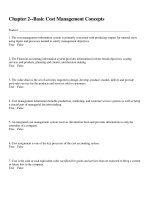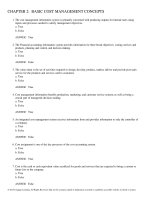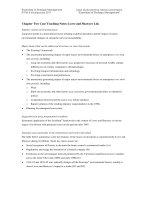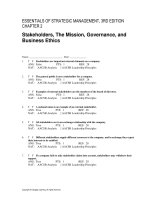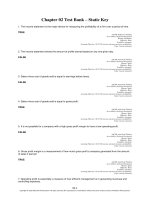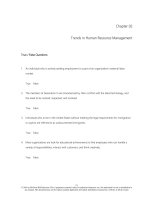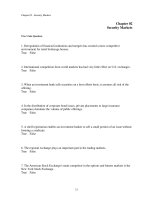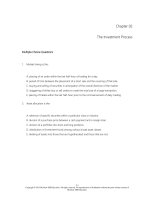Principles of management international edition 12th edition cassidy test bank
Bạn đang xem bản rút gọn của tài liệu. Xem và tải ngay bản đầy đủ của tài liệu tại đây (505.2 KB, 31 trang )
Chapter 2—Management’s Changing Environment: Globalization and Technology
TRUE/FALSE
1. Employees in the 2020 workplace will communicate, connect, and collaborate with one another using
social media.
ANS: T
PTS: 1
NAT: BUSPROG: Analytic
KEY: Bloom's: Comprehension
DIF: Moderate
OBJ: LO: 2-1
STA: DISC: Information Technology
2. Managers and employees in the 2020 workplace will work less in teams and more independently than
ever before.
ANS: F
PTS: 1
NAT: BUSPROG: Analytic
KEY: Bloom's: Comprehension
DIF: Moderate
OBJ: LO: 2-1
STA: DISC: Group Dynamics
3. Managers in the 2020 workplace will need to have the ability to learn new skills, leverage the latest
technology, and apply new knowledge to a fast-changing set of business conditions.
ANS: T
PTS: 1
NAT: BUSPROG: Analytic
KEY: Bloom's: Comprehension
DIF: Moderate
OBJ: LO: 2-1
STA: DISC: Creation of Value
4. According to sociologists, society is the product constant stability.
ANS: F
PTS: 1
NAT: BUSPROG: Analytic
KEY: Bloom's: Comprehension
DIF: Moderate
OBJ: LO: 2-1
STA: DISC: Environmental Influence
5. Based on demographic trends of the new workforce, employment opportunities for both men and
women will continue to grow, but at a faster rate for men.
ANS: F
PTS: 1
NAT: BUSPROG: Analytic
KEY: Bloom's: Comprehension
DIF: Moderate
OBJ: LO: 2-1
STA: DISC: Environmental Influence
6. The study of managerial job opportunities is called demographics.
ANS: F
PTS: 1
NAT: BUSPROG: Analytic
KEY: Bloom's: Knowledge
DIF: Easy
OBJ: LO: 2-1
STA: DISC: Environmental Influence
7. The U.S. workforce is getting older, more diverse, and increasingly female.
ANS: T
PTS: 1
NAT: BUSPROG: Diversity
KEY: Bloom's: Knowledge
DIF: Moderate
OBJ: LO: 2-1
STA: DISC: Environmental Influence
© 2013 Cengage Learning. All Rights Reserved. This edition is intended for use outside of the U.S. only, with content that may be different from the
U.S. Edition. May not be scanned, copied, duplicated, or posted to a publicly accessible website, in whole or in part.
8. At present, the U.S. workforce is at a competitive disadvantage globally because workers are not
sufficiently prepared creating a mismatch between what people can do and what the economy needs
them to do.
ANS: T
PTS: 1
NAT: BUSPROG: Analytic
KEY: Bloom's: Comprehension
DIF: Moderate
OBJ: LO: 2-2
STA: DISC: Environmental Influence
9. To enrich the talent pool of future employees, computer-chip maker Intel developed education
initiatives including a technology training program for more than 7 million teachers worldwide.
ANS: T
PTS: 1
NAT: BUSPROG: Technology
KEY: Bloom's: Knowledge
DIF: Moderate
OBJ: LO: 2-2
STA: DISC: Information Technology
10. According to the U.S. Department of labor, older workers are less productive than the average worker.
ANS: F
PTS: 1
NAT: BUSPROG: Diversity
KEY: Bloom's: Knowledge
DIF: Moderate
OBJ: LO: 2-2
STA: DISC: Environmental Influence
11. Unfortunately, research provides conclusive evidence that older workers have an unacceptably high
rate of workplace accidents.
ANS: F
PTS: 1
NAT: BUSPROG: Diversity
KEY: Bloom's: Knowledge
DIF: Moderate
OBJ: LO: 2-2
STA: DISC: Environmental Influence
12. According to research data, older workers have a higher absenteeism rate than other age groups.
ANS: F
PTS: 1
NAT: BUSPROG: Diversity
KEY: Bloom's: Knowledge
DIF: Moderate
OBJ: LO: 2-2
STA: DISC: Environmental Influence
13. Like all employees, older workers need to be managed according to their individual abilities, not as
members of a demographic group..
ANS: T
PTS: 1
NAT: BUSPROG: Diversity
KEY: Bloom's: Comprehension
DIF: Easy
OBJ: LO: 2-2
STA: DISC: Environmental Influence
14. On average, experienced, professional women without children earn just 77 cents for every dollar that
men earned.
ANS: T
PTS: 1
NAT: BUSPROG: Diversity
KEY: Bloom's: Knowledge
DIF: Moderate
OBJ: LO: 2-2
STA: DISC: Environmental Influence
© 2013 Cengage Learning. All Rights Reserved. This edition is intended for use outside of the U.S. only, with content that may be different from the
U.S. Edition. May not be scanned, copied,������������������������������������������������������������������������������������������������������������������������������������������������������������������������������������������������������������������������������������������������������������������������������������������������������������������������������������������������������������������������������������������������������������������������������������������������������������������������������������������������������������������������������������������������������������������������������������������������������������������������������������������������������������������������������������������������������������������������������������������������������������������������������������������������������������������������������������������������������������������������������������������������������������������������������������������������������������������������������������������������������������������������������������������������������������������������������������������������������������������������������������������������������������������������������������������������������������������������������������������������������������������������������������������������������������������������������������������������������������������������������������������������������������������������������������������������������������������������������������������������������������������������������������������������������������������������������������������������������������������������������������������������������������������������������������������������������������������������������������������������������������������������������������������������������������������������������������������������������������������������������������������������������������������������������������������������������������������������������������������������������������������������������������������������������������������������������������������������������������������������������������������������������������������������������������������������������������������������������������������������������������������������������������������������������������������������������������������������������������������������������������������������������������������������������������������������������������������������������������������������������������������������������������������������������������������������������������������������������������������������������������������������������������������������������������������������������������������������������������������������������������������������������������������������������������������������������������������������������������������������������������������������������������������������������������������������������������������������������������������������������������������������������������������������������������������������������������������������������������������������������������������������������������������������������������������������������������������������������������������������������������������������������������������������������������������������������������������������������������������������������������������������������������������������������������������������������������������������������������������������������������������������������������������������������������������������������������������������������������������������������������������������������������������������������������������������������������������������������������������������������������������������������������������������������������������������������������������������������������������������������������������������������������������������������������������������������������������������������������������������������������������������������������������������������������������������������������������������������������������������������������������������������������������������������������������������������������������������������������������������������������������������������������������������������������������������������������������������������������������������������������������������������������������������������������������������������������������������������������������������������������������������������������������������������������������������������������������������������������������������������������������������������������������������������������������������������������������������������������������������������������������������������������������������������������������������������������������������������������������������������������������������������������������������������������������������������������������������������������������������������������������������������������������������������������������������������������������������������������������������������������������������������������������������������������������������������������������������������������������������������������������������������������������������������������������������������������������������������������������������������������������������������������������������������������������������������������������������������������������������������������������������������������������������������������������������������������������������������������������������������������������������������������������������������������������������������������������������������������������������������������������������������������������������������������������������������������������������������������������������������������������������������������������������������������������������������������������������������������������������������������������������������������������������������������������������������������������������������������������������������������������������������������������������������������������������������������������������������������������������������������������������������������������������������������������������������������������������������������������������������������������������������������������������������������������������������������������������������������������������������������������������������������������������������������������������������������������������������������������������������������������������������������������������������������������������������������������������������������������������������������������������������������������������������������������������������������������������������������������������������������������������������������������������������������������������������������������������������������������������������������������������������������������������������������������������������������������������������������������������������������������������������������������������������������������������������������������������������������������������������������������������������������������������������������������������������������������������������������������������������������������������������������������������������������������������������������������������������������������������������������������������������������������������������������������������������������������������������������������������������������������������������������������������������������������������������������������������������������������������������������������������������������������������������������������������������������������������������������������������������������������������������������������������������������������������������������������������������������������������������������������������������������������������������������������������������������������������������������������������������������������������������������������������������������������������������������������������������������������������������������������������������������������������������������������������������������������������������������������������������������������������������������������������������������������������������������������������������������������������������������������������������������������������������������������������������������������������������������������������������������������������������������������������������������������������������������������������������������������������������������������������������������������������������������������������������������������������������������������������������������������������������������������������������������������������������������������������������������������������������������������������������������������������������������������������������������������������������������������������������������������������������������������������������������������������������������������������������������������������������������������������������������������������������������������������������������������������������������������������������������������������������������������������������������������������������������������������������������������������������������������������������������������������������������������������������������������������������������������������������������������������������������������������������������������������������������������������������������������������������������������������������������������������������������������������������������������������������������������������������������������������������������������������������������������������������������������������������������������������������������������������������������������������������������������������������������������������������������������������������������������������������������������������������������������������������������������������������������������������������������������������������������������������������������������������������������������������������������������������������������������������������������������������������������������������������������������������������������������������������������������������������������������������������������������������������������������������������������������������������������������������������������������������������������������������������������������������������������������������������������������������������������������������������������������������������������������������������������������������������������������������������������������������������������������������������������������������������������������������������������������������������������������������������������������������������������������������������������������������������������������������������������������������������������������������������������������������������������������������������������������������������������������������������������������������������������������������������������������������������������������������������������������������������������������������������������������������������������������������������������������������������������������������������������������������������������������������������������������������������������������������������������������������������������������������������������������������������������������������������������������������������������������������������������������������������������������������������������������������������������������������������������������������������������������������������������������������������������������������������������������������������������������������������������������������������������������������������������������������������������������������������������������������������������������������������������������������������������������������������������������������������������������������������������������������������������������������������������������������������������������������������������������������������������������������������������������������������������������������������������������������������������������������������������������������������������������������������������������������������������������������������������������������������������������������������������������������������������������������������������������������������������������������������������������������������������������������������������������������������������������������������������������������������������������������������������������������������������������������������������������������������������������������������������������������������������������������������������������������������������������������������������������������������������������������������������������������������������������������������������������������������������������������������������������������������������������������������������������������������������������������������������������������������������������������������������������������������������������������������������������������������������������������������������������������������������������������������������������������������������������������������������������������������������������������������������������������������������������������������������������������������������������������������������������������������������������������������������������������������������������������������������������������������������������������������������������������������������������������������������������������������������������������������������������������������������������������������������������������������������������������������������������������������������������������������������������������������������������������������������������������������������������������������������������������������������������������������������������������������������������������������������������������������������������������������������������������������������������������������������������������������������������������������������������������������������������������������������������������������������������������������������������������������������������������������������������������������������������������������������������������������������������������������������������������������������������������������������������������������������������������������������������������������������������������������������������������������������������������������������������������������������������������������������������������������������������������������������������������������������������������������������������������������������������������������������������������������������������������������������������������������������������������������������������������������������������������������������������������������������������������������������������������������������������������������������������������������������������������������������������������������������������������������������������������������������������������������������������������������������������������������������������������������������������������������������������������������������������������������������������������������������������������������������������������������������������������������������������������������������������������������������������������������������������������������������������������������������������������������������������������������������������������������������������������������������������������������������������������������������������������������������������������������������������������������������������������������������������������������������������������������������������������������������������������������������������������������������������������������������������������������������������������������������������������������������������������������������������������������������������������������������������������������������������������������������������������������������������������������������������������������������������������������������������������������������������������������������������������������������������������������������������������������������������������������������������������������������������������������������������������������������������������������������������������������������������������������������������������������������������������������������������������������������������������������������������������������������������������������������������������������������������������������������������������������������������������������������������������������������������������������������������������������������������������������������������������������������������������������������������������������������������������������������������������������������������������������������������������������������������������������������������������������������������������������������������������������������������������������������������������������������������������������������������������������������������������������������������������������������������������������������������������������������������������������������������������������������������������������������������������������������������������������������������������������������������������������������������������������������������������������������������������������������������������������������������������������������������������������������������������������������������������������������������������������������������������������������������������������������������������������������������������������������������������������������������������������������������������������������������������������������������������������������������������������������������������������������������������������������������������������������������������������������������������������������������������������������������������������������������������������������������������������������������������������������������������������������������������������������������������������������������������������������������������������������������������������������������������������������������������������������������������������������������������������������������������������������������������������������������������������������������������������������������������������������������������������������������������������������������������������������������������������������������������������������������������������������������������������������������������������������������������������������������������������������������������������������������������������������������������������������������������������������������������������������������������������������������������������������������������������������������������������������������������������������������������������������������������������������������������������������������������������������������������������������������������������������������������������������������������������������������������������������������������������������������������������������������������������������������������������������������������������������������������������������������������������������������������������������������������������������������������������������������������������������������������������������������������������������������������������������������������������������������������������������������������������������������������������������������������������������������������������������������������������������������������������������������������������������������������������������������������������������������������������������������������������������������������������������������������������������������������������������������������������������������������������������������������������������������������������������������������������������������������������������������������������������������������������������������������������������������������������������������������������������������������������������������������������������������������������������������������������������������������������������������������������������������������������������������������������������������������������������������������������������������������������������������������������������������������������������������������������������������������������������������������������������������������������������������������������������������������������������������������������������������������������������������������������������������������������������������������������������������������������������������������������������������������������������������������������������������������������������������������������������������������������������������������������������������������������������������������������������������������������������������������������������������������������������������������������������������������������������������������������������������������������������������������������������������������������������������������������������������������������������������������������������������������������������������������������������������������������������������������������������������������������������������������������������������������������������������������������������������������������������������������������������������������������������������������������������������������������������������������������������������������������������������������������������������������������������������������������������������������������������������������������������������������������������������������������������������������������������������������������������������������������������������������������������������������������������������������������������������������������������������������������������������������������������������������������������������������������������������������������������������������������������������������������������������������������������������������������������������������������������������������������������������������������������������������������������������������������������������������������������������������������������������������������������������������������������������������������������������������������������������������������������������������������������������������������������������������������������������������������������������������������������������������������������������������������������������������������������������������������������������������������������������������������������������������������������������������������������������������������������������������������������������������������������������������������������������������������������������������������������������������������������������������������������������������������������������������������������������������������������������������������������������������������������������������������������������������������������������������������������������������������������������������������������������������������������������������������������������������������������������������������������������������������������������������������������������������������������������������������������������������������������������������������������������������������������������������������������������������������������������������������������������������������������������������������������������������������������������������������������������������������������������������������������������������������������������������������������������������������������������������������������������������������������������������������������������������������������������������������������������������������������������������������������������������������������������������������������������������������������������������������������������������������������������������������������������������������������������������������������������������������������������������������������������������������������������������������������������������������������������������������������������������������������������������������������������������������������������������������������������������������������������������������������������������������������������������������������������������������������������������������������������������������������������������������������������������������������������������������������������������������������������������������������������������������������������������������������������������������������������������������������������������������������������������������������������������������������������������������������������������������������������������������������������������������������������������������������������������������������������������������������������������������������������������������������������������������������������������������������������������������������������������������������������������������������������������������������������������������������������������������������������������������������������������������������������������������������������������������������������������������������������������������������������������������������������������������������������������������������������������������������������������������������������������������������������������������������������������������������������������������������������������������������������������������������������������������������������������������������������������������������������������������������������������������������������������������������������������������������������������������������������������������������������������������������������������������������������������������������������������������������������������������������������������������������������������������������������������������������������������������������������������������������������������������������������������������������������������������������������������������������������������������������������������������������������������������������������������������������������������������������������������������������������������������������������������������������������������������������������������������������������������������������������������������������������������������������������������������������������������������������������������������������������������������������������������������������������������������������������������������������������������������������������������������������������������������������������������������������������������������������������������������������������������������������������������������������������������������������������������������������������������������������������������������������������������������������������������������������������������������������������������������������������������������������������������������������������������������������������������������������������������������������������������������������������������������������������������������������������������������������������������������������������������������������������������������������������������������������������������������������������������������������������������������������������������������������������������������������������������������������������������������������������������������������������������������������������������������������������������������������������������������������������������������������������������������������������������������������������������������������������������������������������������������������������������������������������������������������������������������������������������������������������������������������������������������������������������������������������������������������������������������������������������������������������������������������������������������������������������������������������������������������������������������������������������������������������������������������������������������������������������������������������������������������������������������������������������������������������������������������������������������������������������������������������������������������������������������������������������������������������������������������������������������������������������������������������������������������������������������������������������������������������������������������������������������������������������������������������������������������������������������������������������������������������������������������������������������������������������������������������������������������������������������������������������������������������������������������������������������������������������������������������������������������������������������������������������������������������������������������������������������������������������������������������������������������������������������������������������������������������������������������������������������������������������������������������������������������������������������������������������������������������������������������������������������������������������������������������������������������������������������������������������������������������������������������������������������������������������������������������������������������������������������������������������������������������������������������������������������������������������������������������������������������������������������������������������������������������������������������������������������������������������������������������������������������������������������������������������������������������������������������������������������������������������������������������������������������������������������������������������������������������������������������������������������������������������������������������������������������������������������������������������������������������������������������������������������������������������������������������������������������������������������������������������������������������������������������������������������������������������������������������������������������������������������������������������������������������������������������������������������������������������������������������������������������������������������������������������������������������������������������������������������������������������������������������������������������������������������������������������������������������������������������������������������������������������������������������������������������������������������������������������������������������������������������������������������������������������������������������������������������������������������������������������������������������������������������������������������������������������������������������������������������������������������������������������������������������������������������������������������������������������������������������������������������������������������������������������������������������������������������������������������������������������������������������������������������������������������������������������������������������������������������������������������������������������������������������������������������������������������������������������������������������������������������������������������������������������������������������������������������������������������������������������������������������������������������������������������������������������������������������������������������������������������������������������������������������������������������������������������������������������������������������������������������������������������������������������������������������������������������������������������������������������������������������������������������������������������������������������������������������������������������������������������������������������������������������������������������������������������������������������������������������������������������������������������������������������������������������������������������������������������������������������������������������������������������������������������������������������������������������������������������������������������������������������������������������������������������������������������������������������������������������������������������������������������������������������������������������������������������������������������������������������������������������������������������������������������������������������������������������������������������������������������������������������������������������������������������������������������������������������������������������������������������������������������������������������������������������������������������������������������������������������������������������������������������������������������������������������������������������������������������������������������������������������������������������������������������������������������������������������������������������������������������������������������������������������������������������������������������������������������������������������������������������������������������������������������������������������������������������������������������������������������������������������������������������������������������������������������������������������������������������������������������������������������������������������������������������������������������������������������������������������������������������������������������������������������������������������������������������������������������������������������������������������������������������������������������������������������������������������������������������������������������������������������������������������������������������������������������������������������������������������������������������������������������������������������������������������������������������������������������������������������������������������������������������������������������������������������������������������������������������������������������������������������������������������������������������������������������������������������������������������������������������������������������������������������������������������������������������������������������������������������������������������������������������������������������������������������������������������������������������������������������������������������������������������������������������������������������������������������������������������������������������������������������������������������������������������������������������������������������������������������������������������������������������������������������������������������������������������������������������������������������������������������������������������������������������������������������������������������������������������������������������������������������������������������������������������������������������������������������������������������������������������������������������������������������������������������������������������������������������������������������������������������������������������������������������������������������������������������������������������������������������������������������������������������������������������������������������������������������������������������������������������������������������������������������������������������������������������������������������������������������������������������������������������������������������������������������������������������������������������������������������������������������������������������������������������������������������������������������������������������������������������������������������������������������������������������������������������������������������������������������������������������������������������������������������������������������������������������������������������������������������������������������������������������������������������������������������������������������������������������������������������������������������������������������������������������������������������������������������������������������������������������������������������������������������������������������������������������������������������������������������������������������������������������������������������������������������������������������������������������������������������������������������������������������������������������������������������������������������������������������������������������������������������������������������������������������������������������������������������������������������������������������������������������������������������������������������������������������������������������������������������������������������������������������������������������������������������������������������������������������������������������������������������������������������������������������������������������������������������������������������������������������������������������������������������������������������������������������������������������������������������������������������������������������������������������������������������������������������������������������������������������������������������������������������������������������������������������������������������������������������������������������������������������������������������������������������������������������������������������������������������������������������������������������������������������������������������������������������������������������������������������������������������������������������������������������������������������������������������������������������������������������������������������������������������������������������������������������������������������������������������������������������������������������������������������������������������������������������������������������������������������������������������������������������������������������������������������������������������������������������������������������������������������������������������������������������������������������������������������������������������������������������������������������������������������������������������������������������������������������������������������������������������������������������������������������������������������������������������������������������������������������������������������������������������������������������������������������������������������������������������������������������������������������������������������������������������������������������������������������������������������������������������������������������������������������������������������������������������������������������������������������������������������������������������������������������������������������������������������������������������������������������������������������������������������������������������������������������������������������������������������������������������������������������������������������������������������������������������������������������������������������������������������������������������������������������������������������������������������������������������������������������������������������������������������������������������������������������������������������������������������������������������������������������������������������������������������������������������������������������������������������������������������������������������������������������������������������������������������������������������������������������������������������������������������������������������������������������������������������������������������������������������������������������������������������������������������������������������������������������������������������������������������������������������������������������������������������������������������������������������������������������������������������������������������������������������������������������������������������������������������������������������������������������������������������������������������������������������������������������������������������������������������������������������������������������������������������������������������������������������������������������������������������������������������������������������������������������������������������������������������������������������������������������������������������������������������������������������������������������������������������������������������������������������������������������������������������������������������������������������������������������������������������������������������������������������������������������������������������������������������������������������������������������������������������������������������������������������������������������������������������������������������������������������������������������������������������������������������������������������������������������������������������������������������������������������������������������������������������������������������������������������������������������������������������������������������������������������������������������������������������������������������������������������������������������������������������������������������������������������������������������������������������������������������������������������������������������������������������������������������������������������������������������������������������������������������������������������������������������������������������������������������������������������������������������������������������������������������������������������������������������������������������������������������������������������������������������������������������������������������������������������������������������������������������������������������������������������������������������������������������������������������������������������������������������������������������������������������������������������������������������������������������������������������������������������������������������������������������������������������������������������������������������������������������������������������������������������������������������������������������������������������������������������������������������������������������������������������������������������������������������������������������������������������������������������������������������������������������������������������������������������������������������������������������������������������������������������������������������������������������������������������������������������������������������������������������������������������������������������������������������������������������������������������������������������������������������������������������������������������������������������������������������������������������������������������������������������������������������������������������������������������������������������������������������������������������������������������������������������������������������������������������������������������������������������������������������������������������������������������������������������������������������������������������������������������������������������������������������������������������������������������������������������������������������������������������������������������������������������������������������������������������������������������������������������������������������������������������������������������������������������������������������������������������������������������������������������������������������������������������������������������������������������������������������������������������������������������������������������������������������������������������������������������������������������������������������������������������������������������������������������������������������������������������������������������������������������������������������������������������������������������������������������������������������������������������������������������������������������������������������������������������������������������������������������������������������������������������������������������������������������������������������������������������������������������������������������������������������������������������������������������������������������������������������������������������������������������������������������������������������������������������������������������������������������������������������������������������������������������������������������������������������������������������������������������������������������������������������������������������������������������������������������������������������������������������������������������������������������������������������������������������������������������������������������������������������������������������������������������������������������������������������������������������������������������������������������������������������������������������������������������������������������������������������������������������������������������������������������������������������������������������������������������������������������������������������������������������������������������������������������������������������������������������������������������������������������������������������������������������������������������������������������������������������������������������������������������������������������������������������������������������������������������������������������������������������������������������������������������������������������������������������������������������������������������������������������������������������������������������������������������������������������������������������������������������������������������������������������������������������������������������������������������������������������������������������������������������������������������������������������������������������������������������������������������������������������������������������������������������������������������������������������������������������������������������������������������������������������������������������������������������������������������������������������������������������������������������������������������������������������������������������������������������������������������������������������������������������������������������������������������������������������������������������������������������������������������������������������������������������������������������������������������������������������������������������������������������������������������������������������������������������������������������������������������������������������������������������������������������������������������������������������������������������������������������������������������������������������������������������������������������������������������������������������������������������������������������������������������������������������������������������������������������������������������������������������������������������������������������������������������������������������������������������������������������������������������������������������������������������������������������������������������������������������������������������������������������������������������������������������������������������������������������������������������������������������������������������������������������������������������������������������������������������������������������������������������������������������������������������������������������������������������������������������������������������������������������������������������������������������������������������������������������������������������������������������������������������������������������������������������������������������������������������������������������������������������������������������������������������������������������������������������������������������������������������������������������������������������������������������������������������������������������������������������������������������������������������������������������������������������������������������������������������������������������������������������������������������������������������������������������������������������������������������������������������������������������������������ different from the
U.S. Edition. May not be scanned, copied, duplicated, or posted to a publicly accessible website, in whole or in part.
e. proactive
ANS: E
PTS: 1
NAT: BUSPROG: Reflective Thinking
KEY: Bloom's: Application
DIF: Challenging OBJ: LO: 2-4
STA: DISC: Environmental Influence
149. Refer to A Tale of Two Managers. Frank and Renee, according to the text discussion, can employ all
of these political strategies except
a. indirect lobbying.
b. coalition building.
c. campaign financing.
d. lobbying.
e. civil disobedience.
ANS: E
PTS: 1
NAT: BUSPROG: Reflective Thinking
KEY: Bloom's: Application
DIF: Challenging OBJ: LO: 2-4
STA: DISC: Environmental Influence
150. Refer to A Tale of Two Managers. If Pharma-cost.com partners with a software company to develop a
new technology that would allow doctors and patients to process prescriptions from anywhere they
will be using a(an) ____ strategy.
a. financing
b. lobbying
c. legal
d. innovation
e. indirect lobbying
ANS: D
PTS: 1
NAT: BUSPROG: Reflective Thinking
KEY: Bloom's: Application
DIF: Challenging OBJ: LO: 2-4
STA: DISC: Creation of Value
ESSAY
151. Congratulations! You have been hired by the American Association for Retired People (AARP) to
develop and education program for managers that reinforces the value older workers bring to the
workplace and dispells the negative stereotypes about older workers. Outline your education
program, describe how supervisors should effectively manage older workers as compared to younger
workers, describe why older workers are valuable to an employer and disprove the five most common
myths about wolder workers.
ANS:
The government defines older workers as age 55 and older. They are projected to be the largest age
group in the U.S. Workforce by 2018.
Like all employees, older workers need to be managed according to their individual abilities, not as
members of a demographic group. Training should be conducted to for ALL employees to the dispell
the myths below. Older workers should become confident working with technically savvy teammates
and younger bosses.
Myth #1: Older workers are less productive than the average worker.
© 2013 Cengage Learning. All Rights Reserved. This edition is intended for use outside of the U.S. only, with content that may be different from the
U.S. Edition. May not be scanned, copied, duplicated, or posted to a publicly accessible website, in whole or in part.
Fact: Research shows that productivity does not decline with a worker's age.
Myth #2: The costs of employee benefits outweigh any possible gain from hiring older workers.
Fact: Health insurance costs increase with age, but most other fringe benefits do not since they are tied
to length of service and level of salary.
Myth #3: Older workers are prone to frequent absences because of age-related sickness.
Fact: Data show that workers age 65 and older have attendance records that are equal to or better than
most other age groups of workers.
Myth #4: Older workers have an unacceptably high rate of accidents at work.
Fact: Data show that older workers account for only 9.7 percent of all workplace injuries while they
make up 13.6 percent of the labor force.
Myth #5: Older workers are unwilling to learn new jobs and are inflexible about the hours they will
work.
Fact: The truth depends on the individual.
PTS: 1
DIF: Challenging
NAT: BUSPROG: Reflective Thinking
KEY: Bloom's: Synthesis
OBJ: LO: 2-2
STA: DISC: Environmental Influence
152. Describe your understanding of Managing Diversity, who within an organization is impacted by this
process, and who benefits? Describe at least five examples of diversity programs that are having a
positive impact on today’s workplace.
ANS:
Managing diversity is the process of creating an organizational culture that enables ALL employees,
including women and minorities, to realize their full potential. If done properly, everyone benefits
including the employees, managers, owners and\or shareholders. Diversity programs build on EEO
and affirmative action programs to create more flexible organizations where everyone has a fair chance
to thrive and succeed. These programs need to include everyone (from white males to black females)
the point is that everyone has individual differences (opinions, lifestyles, age, etc.) it is not simply
about a person’s gender or the color of their skin. The ultimate goal is to adjust our thinking, to move
from tolerance to valuing people and their contributions.
Promising Beginnings:
Diversity programs in use today
Teaching English as a second language
Creating mentor programs
Providing immigration assistance
Fostering the development of support groups for minorities
Training minorities for management positions
Training managers to value and skillfully manage diversity
Encouraging employees to contribute to and attend cultural celebrations and events
Creating, publicizing, and enforcing discrimination and harassment policies
Actively recruiting minorities
© 2013 Cengage Learning. All Rights Reserved. This edition is intended for use outside of the U.S. only, with content that may be different from the
U.S. Edition. May not be scanned, copied, duplicated, or posted to a publicly accessible website, in whole or in part.
PTS: 1
DIF: Challenging
STA: DISC: Environmental Influence
OBJ: LO: 2-3
NAT: BUSPROG: Diversity
KEY: Bloom's: Synthesis
SHORT ANSWER
153. Discuss the demographics of the New Workforce.
ANS:
The U.S. workforce demonstrates the following trends: It is getting larger 3/4 the labor force is
predicted to grow at a faster rate than the national population; It is increasingly female 3/4
employment opportunities for both men and women will grow, but at a faster rate for women; It is
getting more racially and ethnically diverse 3/4 Hispanics have replaced African-Americans as the
second-largest segment; It is getting older 3/4 the median age of employees will continue to grow, with
the most vigorous growth in the 55-and-older group.
PTS: 1
DIF: Challenging
STA: DISC: Environmental Influence
OBJ: LO: 2-1
NAT: BUSPROG: Diversity
KEY: Bloom's: Synthesis
154. How would you respond to a manager who made this statement: "Managing diversity is equal
employment opportunity, only with a fancy new name"?
ANS:
Not true 3/4 managing diversity extends EEO by fostering organizational cultures that tap the full
potential of all employees. While EEO can help women and minorities get fair access to jobs,
managing diversity programs are needed to help them feel like valuable members of the organization.
White males, as well, have lots of individual differences that need to be valued and accommodated in
the workplace. We need to move beyond tolerating individual differences to appreciating and valuing
those differences. Anything short of that will unnecessarily waste valuable human resources.
PTS: 1
DIF: Challenging
STA: DISC: Environmental Influence
OBJ: LO: 2-3
NAT: BUSPROG: Diversity
KEY: Bloom's: Synthesis
155. If managers can't stay out of politics, what should they do?
ANS:
Managers are being increasingly politicized by competing demands made upon their organizations.
Thus, managers need to avoid being surprised by political forces by engaging in issues management.
This is an ongoing process of identifying, evaluating, and responding to relevant social and political
issues. They also need to be more proactive relative to campaign financing, lobbying, coalition
building, and indirect lobbying.
PTS: 1
DIF: Challenging
STA: DISC: Environmental Influence
OBJ: LO: 2-4
NAT: BUSPROG: Analytic
KEY: Bloom's: Synthesis
© 2013 Cengage Learning. All Rights Reserved. This edition is intended for use outside of the U.S. only, with content that may be different from the
U.S. Edition. May not be scanned, copied, duplicated, or posted to a publicly accessible website, in whole or in part.
156. Why is the global economy a personal matter?
ANS:
As we move toward a single global marketplace, with sweeping trade agreements such as NAFTA and
WTO, any given employee could end up working for a foreign-owned company. Also, global
competition is raising quality standards and lowering wage standards worldwide.
PTS: 1
DIF: Challenging
STA: DISC: Environmental Influence
OBJ: LO: 2-5
NAT: BUSPROG: Analytic
KEY: Bloom's: Synthesis
157. Why does it take more than a good idea to be innovative?
ANS:
A good idea actually is only the first step in the three-step innovation process. The new idea needs to
be translated into a working prototype (called product technology) and then produced effectively and
efficiently in profitable quantities (called production technology). The time it takes to turn a good idea
into satisfied demand (and, hopefully, profits) is called innovation lag. Good ideas without follow-up
are practically worthless.
PTS: 1
DIF: Challenging
STA: DISC: Creation of Value
OBJ: LO: 2-6
NAT: BUSPROG: Analytic
KEY: Bloom's: Synthesis
158. What is an intrapreneur? How do they differ from entrepreneurs?
ANS:
An intrapreneur is an employee who takes personal “hands-on responsibility” for pushing any type of
innovative idea, product or process through an organization. They strive to achieve innovation within
their existing organizations. They tend to have a higher need for security. Entrepreneurs on the other
hand tend to be more comfortable with risk and they pursue their dreams and innovation through their
own companies or ventures rather for an existing employer.
PTS: 1
DIF: Challenging
STA: DISC: Individual Dynamics
OBJ: LO: 2-6
NAT: BUSPROG: Analytic
KEY: Bloom's: Synthesis
© 2013 Cengage Learning. All Rights Reserved. This edition is intended for use outside of the U.S. only, with content that may be different from the
U.S. Edition. May not be scanned, copied, duplicated, or posted to a publicly accessible website, in whole or in part.

